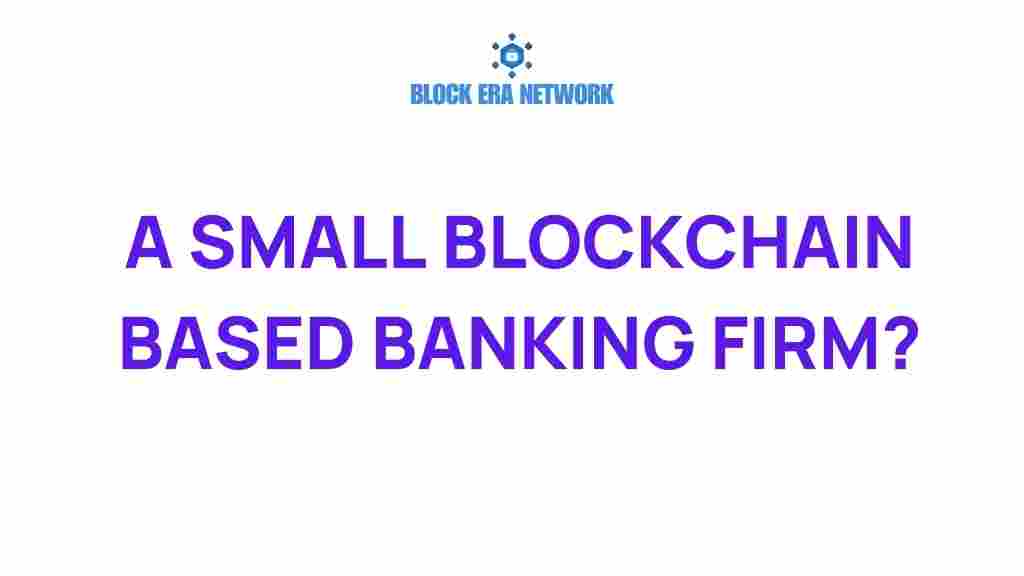Unveiling the Future: How a Small Blockchain-Based Banking Firm is Disrupting Finance
The financial landscape is undergoing a seismic shift, with blockchain banking at the forefront of this revolution. A small but innovative firm is leveraging blockchain technology to create solutions that challenge traditional banking norms. As we delve into this transformative journey, we will explore the impact of financial innovation, decentralized finance (DeFi), and the role of fintech in reshaping the future of banking.
Understanding Blockchain Banking
Blockchain banking represents a convergence of blockchain technology and banking services. This approach not only enhances transparency but also empowers users by providing them with greater control over their finances. Here’s how it works:
- Decentralization: Traditional banking relies on central authorities, whereas blockchain banking distributes power across a network.
- Transparency: Every transaction is recorded on a public ledger, ensuring accountability.
- Security: Cryptographic techniques safeguard data, reducing the risk of fraud.
With the rise of blockchain banking, many are questioning whether traditional banking can survive in this new era of financial innovation.
The Rise of Financial Innovation
Financial innovation is not just a buzzword; it’s an essential component of today’s economic ecosystem. The evolution of financial services is driven by technological advancements that streamline operations, enhance customer experience, and introduce new products. Blockchain banking is a significant player in this space:
- Instant Transactions: Blockchain enables near-instantaneous transactions, eliminating the delays associated with traditional banking.
- Reduced Fees: By cutting out intermediaries, blockchain banking substantially lowers transaction costs.
- Access to Global Markets: Users can transact globally without the need for currency exchanges or international banking fees.
As financial institutions face increasing pressure to adapt, those that incorporate blockchain technology into their operations will likely emerge as leaders in the market.
The Role of Decentralized Finance (DeFi)
Decentralized finance, or DeFi, refers to a burgeoning ecosystem of financial applications built on blockchain technology. DeFi platforms enable users to lend, borrow, trade, and earn interest on their cryptocurrency holdings without the need for traditional banking intermediaries. This shift is a cornerstone of blockchain banking:
- Peer-to-Peer Lending: Users can lend and borrow directly, often yielding better rates than traditional banks.
- Yield Farming: Platforms allow users to earn interest on their crypto assets, incentivizing participation.
- Smart Contracts: Automated contracts execute transactions based on pre-defined conditions, ensuring trust and efficiency.
DeFi not only democratizes access to financial services but also fosters a culture of innovation in the fintech space.
Innovative Crypto Solutions
As blockchain banking evolves, innovative crypto solutions are at the forefront, offering diverse financial services. Here are some examples:
- Stablecoins: Pegged to stable assets, these cryptocurrencies provide a stable medium of exchange, facilitating transactions.
- Decentralized Exchanges (DEXs): DEXs enable users to trade cryptocurrencies directly, without the need for centralized control.
- Tokenized Assets: Real-world assets can be tokenized on the blockchain, providing liquidity and accessibility.
These solutions are revolutionizing the financial landscape, paving the way for a more inclusive and efficient system.
Challenges and Troubleshooting Tips
While the rise of blockchain banking and decentralized finance offers immense potential, it also presents challenges that must be addressed. Here are some common issues and troubleshooting tips:
1. Security Concerns
Although blockchain technology is inherently secure, vulnerabilities can exist in smart contracts and user practices:
- Tip: Always audit smart contracts and utilize reputable platforms to mitigate risks.
- Tip: Use hardware wallets for storing cryptocurrencies instead of keeping them on exchanges.
2. Regulatory Hurdles
The regulatory landscape surrounding blockchain banking is constantly evolving, which can create uncertainty:
- Tip: Stay informed about regulatory changes and ensure compliance with local laws.
- Tip: Engage with legal experts who specialize in blockchain technology and finance.
3. Technology Integration
Integrating blockchain solutions with existing banking infrastructures can be complex:
- Tip: Develop a clear strategy for integration, including timelines and resource allocation.
- Tip: Collaborate with experienced blockchain developers to streamline the process.
By addressing these challenges, companies can better position themselves to harness the full potential of blockchain banking.
The Future of Digital Banking
As we look towards the future, the landscape of digital banking will undoubtedly evolve. Blockchain technology will play a critical role in shaping this transformation:
- Enhanced Customer Experience: With user-centric features and seamless interfaces, blockchain banking will cater to the demands of a tech-savvy clientele.
- Increased Financial Inclusion: Blockchain banking can reach unbanked populations, providing them with access to essential financial services.
- Innovative Products: Expect new financial products that leverage blockchain technology to meet diverse consumer needs.
The integration of blockchain banking into the mainstream is not a question of if, but when. Financial institutions that embrace this technology will be better equipped to thrive in a rapidly changing environment.
Conclusion: Embracing the Banking Disruption
In conclusion, a small blockchain-based banking firm is leading the charge in disrupting the finance industry through innovative financial solutions. The emergence of blockchain banking, powered by decentralized finance, presents an opportunity for a more transparent, secure, and inclusive financial system. As we navigate this exciting landscape, it is crucial for both consumers and businesses to stay informed about the latest developments in fintech, cryptocurrency, and digital banking.
By embracing the principles of banking disruption, we can collectively steer towards a future where financial services are accessible to all. For more insights into blockchain technology and its applications in finance, visit this resource.
As the industry evolves, those who adapt and innovate will lead the way, transforming challenges into opportunities in the dynamic world of blockchain banking.
This article is in the category Decentralized Finance (DeFi) and created by Block Era Network Team
